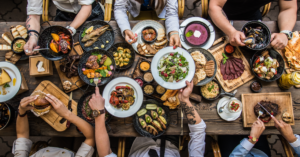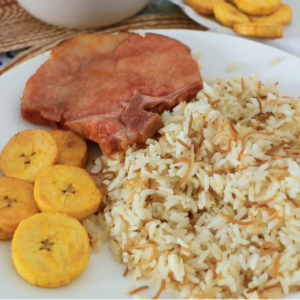This blog was written for the RSA Blog Student Summer Series that will highlight graduate student success in regional studies across the globe throughout the summer.
Our relationship with food is complex. Food consumption may be one of the few experiences that involves all of our senses at the same time. Add to that the emotional, regional, and socio-cultural components linked to the food we eat: the context, the person who prepared it, the people you are sharing it with, the memories it brings, among many others. And, it gets even more complex, when we consider that food systems are one of the main drivers of climate change, as well as one of the aspects in which social and gender inequities are most visible. However, we are not always aware of how the food we eat impacts the planet, our bodies, other people, and other non-human species.

© Olga Klochanko – Shutterstock
Initiatives such as The Great Food Transformation as well as the latest studies on planetary boundaries have raised the need for changes in our current plate. These changes – in a nutshell – involve moving towards a plant-based diet. Thus, a sustainable plate is high in vegetables, fruits, legumes, nuts, and whole grains. Meanwhile, the presence of red and processed meats, refined carbohydrates (e.g. white bread, white rice), sugar, and saturated fats is very low. Although many of us would like to move towards a more healthy, environmentally friendly, and fair plate, what we eat indicates otherwise. For instance, in Colombia a common plate would show a high presence of white rice, potatoes and plantains, accompanied by a portion of chicken or beef, and a very low presence – or a complete absence – of vegetables and fruits.

© Mario De Moya F – Shutterstock
Moving toward a more sustainable plate in Colombia
Considering the plate presented above, our study seeks to answer the following questions: what tensions emerge among food motives when moving towards a more sustainable plate in Colombia? Each of us has diverse motives to eat the food that we eat, but are these motives in tension with different aspects of sustainability? If so, what kind of tensions emerge? In our study we analyse the tensions that emerge between individual motives – such as habits, liking, traditions, convenience, price, among others – and sustainability dimensions – like environmental impacts, health and nutrition, affordability, fair conditions for producers, animal welfare, and sociocultural dynamics -, and this is where it gets interesting.
Health and nutrition vs. family traditions in Colombia
Through visual diaries and game-based interviews we find “health and nutrition” and “family traditions” as the main motives behind the Colombian plate. While most participants have an idea about what they “should” eat and highlight the importance of a healthy diet, food literacy collides with sociocultural dynamics like family traditions. Thus, answering the questions presented above, our findings show “family traditions” as one of the elements that generates more tensions with sustainability dimensions. In a culture characterized by collectivistic values such a Colombia, many prefer to conform with a less healthy and less sustainable plate to avoid a confrontation with emotionally relevant figures (i.e., Mother and Grandmother). In other words, no one wants to argue with Mom or Grandma over the meat, white rice, potatoes, and plantains that they prepared with so much love. The contents of the plate reflect an intergenerational presence that is strengthened by the emotional nourishing role of the Latina mother and the convenience of having someone who cooks at home.
Hence, we find three relevant tensions in the route towards a more sustainable plant-based diet in this study. First, participants perceive a socio-affective risk in eating differently – and more sustainable – since it could imply losing relevant relationships. Second, although participants show concern for animal welfare, animal-based products are so embedded in everyday family practices that negotiating these habits is seen as a cumbersome task. Third, in Colombia food preparation is still the responsibility of women, and as many young women enter the workforce, the help of older generations with food preparation becomes convenient, as well as time and cost effective.
Consequently, initiatives and policy aimed at promoting sustainable diets in a country like Colombia, could consider the tensions arising from sociocultural dynamics such as family traditions. This study opens new questions. For instance, since food is one of the many responsibilities assumed mainly by woman, would a change on gender roles around food and caring for others help in a transition towards sustainable diets? Also, how could family narratives regarding food consumption be transformed in a country like Colombia?

Laura Blanco-Murcia (Twitter @laurablancom57 and LinkedIn) is a PhD student in Sustainability Management at the University of Waterloo in Waterloo, Canada.

Isabella Gomati de la Vega (LinkedIn) is a PhD student in Neuroscience at the Pontificia Universidad Javeriana, Colombia.

Jesús Perdomo-Ortíz (Twitter @chuchoperdomo) is a full professor at the Pontificia Universidad Javeriana, Colombia.

Juan P. Rodríguez-Pinilla (LinkedIn) is a Graduate of the Business Administration program at the Pontificia Universidad Javeriana, Colombia.
Are you currently involved with regional research, policy, and development? The Regional Studies Association is accepting articles for their online blog. For more information, contact the Blog Editor at rsablog@regionalstudies.org.